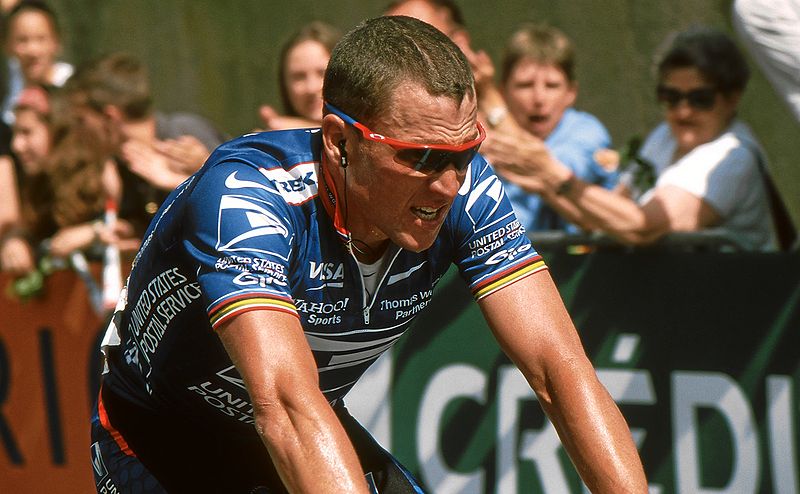What if Lance Armstrong Were a Literary Genius?

Photograph by Benutzer:Hase.
Imagine you're reading the new Pulitzer winner. It's a two-thousand-page novel, called Tour de France, by Lance Von Armstronger. In the next room, your significant other watches TV. There's the sound of a car chase, an explosion, but even the screams barely penetrate your consciousness. Tour de France is riveting. The narrative tension gives you butterflies. Von Armstronger never tires. Just when you think he's played out a conflict, it becomes more complex and you race to keep up. Your only disbelief is with the author himself—the thought, "How does he do it?"
Then, oddly, you hear his name on TV. It's the evening news. The anchor says that Lance Von Armstronger has finally confessed to using performance-enhancing drugs and will be stripped of the Pulitzer. Do you stop reading? Do you throw down the novel and take a cold shower to clear your head that gut-deep what's-next feeling?
Novelists and intellectuals aren't faced with the same expectations as athletes. When Mo Yan claimed the Nobel, he wasn't relieved that a decade of blood tests came up clear. But what if we were to discount writers who used substances for endurance and inspiration? Would we pull Baudelaire and Coleridge from the libraries for their opium-inspired texts? Would Stephen King be stripped of royalties for his cocaine-fueled bestsellers? Would fellow cokeheads Robert Louis Stephenson and Sigmund Freud be dismissed, or those on speed, like Philip K. Dick, Graham Greene, Auden and Kerouac? The list goes on. Even the discovery of DNA, by Nobel Prize-winners Francis Crick and James Watson, required some LSD. At least Sartre admitted to his use of amphetamine, and, as if in good faith, when the Nobel was awarded to him, he turned it down.
What if we were to ask Sartre why he didn't play fair? I suspect his argument would hint at self-sacrifice, at trying to break through limitations to give the world unimagined experiences. At this moment, when Lance Armstrong has been stripped of his Tour de France titles and is expected, in an interview today with Oprah Winfrey, to confess to doping, it's hard not to wonder how he, too, could justify his actions. Was doping not a ruthless means of winning but a slow shift, something that began innocently? Was it like when I was in college and bought a can of Adrenaline Rush from the library store and worked fourteen hours, feeling that, yes, genius was attainable? Later, when I couldn't find Adrenaline Rush, I used Rockstar, and though its effects diminished and I stopped, I could easily have gone the way of Sartre.
Products everywhere promise "energy," and our economy runs on caffeine as much as on oil. We are raised on performance-enhancing stories. Our heroes get bit by radioactive spiders, exposed to solar storms, are subject to experiments in secret bunkers. They are the man out, the oddball who, until then, got picked on. We forgive these lonely victims, since only villains transform themselves deliberately, seeking power. But most people watch Limitless wishing they had DMZ, and what of Asterisk, in the land of the Tour de France? He dopes up on magic potion and kicks ass. The Romans should have him do a pee test before each war.
We rarely see our heroes earn their power. Batman doesn't dope, but how did he get so strong and flexible when, after years of yoga, I couldn't dream of being the same? We want our heroes to defy the rules, which, in a way, Lance Armstrong has done. He held a title longer than anyone else while inspiring and fooling all of us, and possibly heading a doping ring of immense complexity. This requires not just cunning and leadership but more vision and discipline than the Tour de France itself. We can at least admire him as one of history's great super-villains.
And yet what if, in his confession, he were to explain himself in such a way that we, seeing him ride clean someday, would cheer? Like Sartre, could he talk of sacrifice, of inspiring others, or show himself to be the victim of our culture of performance, just struggling to fit in? Who wouldn't read that memoir? And in fairness, if I were to arrive at my publisher tomorrow and find my editor in his office, a medical team gathered about, with blood transfusions and syringes, and he were to say, "Listen, I need your next book to win prizes and change the world," I'm not sure what I would do.
Subscribe to Maisonneuve today.
Related on maisonneuve.org:
—Et Tu, Lance?
—LiveStrong Indeed
—Un-levelling the Playing Field





